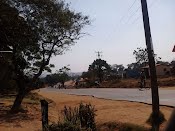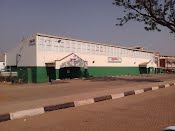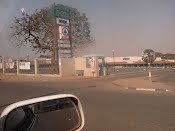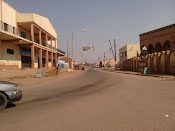Well I thought i'd bite the bullet and blog a recent paper I wrote on NGO access during humanitarian crises. If you can make it all the way through all 3500 words without snoozing, i'd love to hear your comments and/or suggestions!
Under what circumstances are NGOs unable to gain access to vulnerable populations? What are the implications for aid policy?
Gaining access to vulnerable populations is frequently a difficult task. Non-Governmental Organisations (NGOs) face many circumstances where they are unable to gain access to vulnerable populations, as well as fierce criticism when they fail in their relief efforts. As with much of aid and development, the story isn’t wholly negative and there have been significant technical innovations recently that have facilitated improved access for NGOs. NGOs continue to operate in remote, unpopular and hostile environments and the challenges they face should not be overlooked. The aim of this paper is not to criticise what is already widely regarded as a flawed sector within the aid industry; rather it is to constructively contribute to the debate on access. I will draw out two main thematic areas under which NGOs are unable to gain access to vulnerable populations, namely: technicalities and hostile conflict zones. Following on from that, I will explore the idea that these circumstances mask deeper factors in providing relief; strategic interest and convenience. These influences are indicative of a shift in aid policy which I will discuss in an analysis on the implications of ‘access’ on aid policy in terms of conceptual, political and practical implications.
At this juncture, it would be wise to clarify some the key terms used here. When referring to NGOs in this paper, I am largely referring to specialist emergency NGOs who relief agencies who provide assistance. Access applies both to NGOs in terms of their access to vulnerable people, as well as to people in terms of their access to assistance. This paper will only look at NGOs’ access to people, but it is still important to recognise the duality of access in understanding it as a concept. Access ‘enables an impartial assessment of, and response to, people’s needs’ (Mancini-Griffoli & Picot 2004:12). I have taken vulnerable populations to mean those that are prone to suffering conflict, sustained poverty or emergencies such as famine. For the purpose of this essay I will be focusing on access issues relating to man-made disasters and humanitarian crises as opposed to environmental disasters.
Under what circumstances are NGOs unable to gain access to vulnerable populations?
NGOs attempt to provide assistance and relief to any person who is in need of assistance and unable to receive it from their own state. The four Humanitarian Principles developed by Henri Dunont of the Red Cross; Impartiality, Neutrality, Humanity and Independence, form the modus operandi from which NGOs operate. In consultation with the literature, I have drawn out two main themes that occur in accounts of when NGOs are unable to gain access. Though there are different circumstances of denied access in the literature, for brevity’s sake, I will illustrate the thematic areas of technicalities, and conflict zones as the main overarching circumstances as to why NGOs are unable to gain access to vulnerable populations.
Circumstances of technicalities
NGOs often find themselves unable to gain access to vulnerable populations because of bureaucratic regulations and a lack of accurate data leading to ‘forgotten populations’. These circumstances represent challenges to NGOs and have important policy implications. The bureaucracy surrounding NGO registration in Bosnia and Iraq serves as a good illustration of where NGOs are unable to gain access to the vulnerable because of technicalities. Bolton and Jeffrey argue that NGO registration was a tactic employed by authorities to control relief efforts and NGO access, adding that ‘the legislation in Bosnia and Iraq acted as a barrier to entry to organisations that were small, underfunded, or had significant political differences with the international authorities’ (Bolton & Jeffrey 2008:604). The implications on aid policy of this was that the NGO registration process became a deeply political matter and NGOs found themselves having to either disregard the law or identify themselves with a ‘side’. Another illustration of bureaucracy came from the Operation Lifeline Sudan (OLS) where it reported that in January 2000 there were ‘seventeen locations which were made inaccessible by air due to flight restrictions imposed by the government’ (Marriage 2006:481).
Médecins Sans Frontières (MSF) conducted a survey in the Democratic Republic of Congo (DRC) which was ‘invaluable for documenting the plight of forgotten populations … in desperate need of assistance’ (Herp 2003:142). Whilst it is true that these surveys are typically only conducted in broadly accessible areas, it is worth noting that there are regions so remote and rural in the world that many NGOs would be unable to gain access to the vulnerable simply because they did not know they existed. These ‘forgotten populations’ are conveniently identified through these surveys and NGOs are able to implement their programmes.
Circumstances of conflict and hostility
Areas consumed by conflict and hostility are, by far, the most commonly cited circumstances of NGOs being unable to gain access to vulnerable populations. Conflict in the DRC, Iraq and Afghanistan are recent examples of countries where NGOs have repeatedly struggled to gain access to vulnerable populations due to hostility and insecurity. In 2003, NGO workers in Iraq were affected by a profound sense of insecurity and experienced numerous assassination attempts against personnel (Bolton and Jeffrey 2008). Rebel held areas in the DRC remained hostile to NGOs, and ‘between December 1999 and July 2000, MSF was forced to suspend activities in Kimpangu due to insecurity’ (Herp 2003:143). Even in areas not directly affected by the conflict, MSF found that in some provinces there were huge numbers of refugees but ‘roads and bridges throughout … have literally disappeared, making many areas practically inaccessible’ (Ibid.:144).
Under the surface of these circumstances lies a stark reality that in some (but not all) circumstances, insecurity can be linked back to the way that NGOs are operating. ‘They should be asking whether aspects of the way they are imposing their own formulae on the local reality could be leading to this kind of misunderstanding’ (Harragin & Chol 1998:37). Whilst this is not particularly constructive in the debate on terms of access for NGOs, it further iterates the point that NGOs consistently give reasons for not being able to access the vulnerable without studying the real causes of hostilities. Almost all circumstances, whilst often legitimate, are masking deeper motivations by NGOs for gaining access to and providing relief for vulnerable populations. Access based on strategic interest and convenience, provides us with two alternative explanations of why NGOs are really unable to gain access to the vulnerable.
Securing Strategic Interests
One of the biggest questions facing aid workers and policy makers alike is why NGOs push for access in some countries despite obvious security restrictions in order to assist vulnerable populations (such as in Iraq and Afghanistan) and why they remain apathetic to crises of monumental proportions (for example the famine experienced by the Dinka in South Sudan in the late 1980s, see Keen 1991). Indeed, during the 1980s there was little regard for the law or ‘hostile environments’ on the moral grounds that people were suffering and had needs that could be met. Despite involving crossing into a sovereign territory illegally, in the 1980s, 200 NGOs were involved in a discrete cross-border relief operation carrying much needed aid into war-torn Afghanistan (Duffield 2007:73). Along with numerous unglamorous tales of taking risks, this is testament to the commitment of aid workers the world over to get access – and ultimately aid provision – to those who need it most. And those who need it most generally tend to be the least accessible (a logical deduction). However there is often more at stake than acting on what is morally ‘right’, and the pressures on donors to act according to their home political environment and ensuing strategic interests are great. One study succinctly illustrates the importance of strategic interest and safeguarding regional security by comparing the humanitarian crisis in Kosovo (which resulted in a large scale humanitarian intervention), next to the relatively unpublicised and unassisted protracted crises in both Angola and Sudan (Olsen 2003:118).
As we can see from the following data, aid recipients are rarely the countries that need aid the most; instead countries of strategic importance to the big donors of the West tend to receive the biggest aid flows. The data was pulled from the OECD database, and to act as a useful comparison I have listed the ten countries with the lowest Human Development Index (HDI) rank. The data is illustrative for this purpose but a much more thorough analysis comparing the use of such different data sets is beyond the scope of this essay.
Figure 1. Top Ten Vs Bottom Ten
| Top Ten Recipients of Gross ODA from the United States (USD million) | | Ten states with lowest HDI rank (ranked out of 187 countries) | ||
| Afghanistan | 2 991 | DRC | 187 | |
| Iraq | 1 985 | Niger | 186 | |
| Pakistan | 906 | Burundi | 185 | |
| Sudan | 840 | Mozambique | 184 | |
| Ethiopia | 801 | Chad | 183 | |
| West Bank & Gaza Strip | 783 | Liberia | 182 | |
| Haiti | 714 | Burkina Faso | 181 | |
| Kenya | 579 | Sierra Leone | 180 | |
| Colombia | 539 | Central African Republic | 179 | |
| South Africa | 527 | Guinea | 178 | |
Furthermore, we can understand that ‘assuaging the conscience of the industrialised world’ (Harragin & Chol 1998: 60) is also important to agencies. In this way, NGOs are not targeting the vulnerable based on requests from the vulnerable themselves, rather as a way of proving to the world that they are assisting the needy (Ibid.:60). In this way, we can challenge the framing of the ‘vulnerable’ in the pledge of NGOs to provide humanitarian assistance by realising that the targeting of the vulnerable – though central to the self-image of aid – might not be the best way of reaching those in need, or of providing relief full stop (Ibid.:61).
Whilst this could easily lead us on to a more considered discussion of the motivations behind the giving and receiving of aid and the framing of access, this will not be done here. What we can conclude though is that the moral basis for gaining access to vulnerable populations is not a good enough method by which to understand access; whether or not a donor country has strategic interests in an area is more indicative of whether or not an NGO will then gain access or not (Herp 2003; Whitman 2005; Olsen 2003; Hendrickson 1998). In their paper on the determinants of levels of assistance, Olsen convincingly argues that the degree of political interest can help explain why NGOs gain access to some humanitarian crises and not others (Olsen, Carstensen & Hoyen: 2003).
Convenient Access
The idea that NGOs find themselves unable to gain access to areas when it’s inconvenient is a strong claim to make, but one that is increasingly compelling. In many instances where inaccessibility is claimed, NGOs could well have gained access. Firstly, concerns with getting relief to a defined ‘accessible’ area based on official government definitions are limiting (Keen 1991: 159); secondly inaccessibility can often be overcome – for example – with relief flights, as was the case with the town of Abyei in South Sudan during August 1988, which received no aid despite the existence of an airstrip that was used to deliver relief months later (Ibid.); and most importantly there are a number of examples of ‘donors assisting rebel-held areas without the consent of a sovereign government’ (Ibid.:160). Keen explicitly lays out the contradictions of NGOs providing relief to vulnerable populations, something which reveals the reality that NGOs gain access when it’s convenient to do so. A lack of explanation for many anecdotal examples of ‘claimed’ inaccessibility demonstrates that NGOs do not endeavour to access all vulnerable people universally (which may not be empirically surprising, but conceptually this tells us that the very foundations of NGOs and their claims to rights and principles are not followed).
Implications for aid policy
In order to properly evaluate and assess the implications of the aforementioned issues on aid policy I will look at conceptual, political and then finally, practical implications.
‘Rather than moral terms, the need for post-interventionary development is now based on security grounds’ (Duffield 2007:81). A key impact on aid policy is revealed here; we have entered a new era of conceptualising humanitarianism whereby security factors must be taken into account when considering access and assistance. Though these sorts of shifts are not new (example: the shift in aid policy in the 1980s that saw a diminished role for the state and a new powerful role for NGOs; Duffield 2008), they are dually significant; intra state conflicts have risen in the past 20 years, and, the distance between military and relief responses has shrunk considerably leading to combined efforts in humanitarian crises. This does unfortunately come with its own set of problems, though there is not space to explore these here.
Another conceptual implication which consistently links back to themes discussed here and elsewhere in the literature on access is the framing of access, and the role of denial in sustaining assistance; facilitated by a language of rights and principles (Marriage 2006:479). The ‘responsibility to protect’, for example, and the authority that NGOs have claimed without any real legitimacy is an illustration of this. Unfortunately there lies a large gap between the conceptual universalist claims proclaimed by NGOs and relief agencies, and their practical failure to provide assistance in accordance with their defining principles. Marriage uses the example of OLS to highlight this gap, and the practical challenges that NGOs encounter in trying to relieve humanitarian crises whilst also trying to maintain funding and favour.
In the Save the Children study on vulnerability in South Sudan (i.e. a reputable agency and a widely cited publication), the authors explicitly describe Western agencies presenting themselves as the ‘solution’ in situations requiring humanitarian assistance, framing the situation from a Western perspective. ‘Overseas aid is a western solution, but the problem lies as much in its being seen as a ‘solution’ as in its being ‘western’’ (Harragin & Chol 1998:33). These issues have an impact on aid policy in the sense that NGOs feed on rhetoric and labels, framing humanitarian crises in terms that favour them and their ‘solutions’. These actions go on largely unchallenged by governments or authorities and so continues to shape aid policy as NGOs exert significant influence on future policies on how to manage and respond to humanitarian crises.
The growing body of literature on access and emergency relief is indicative of the influence that academic research has on aid policy. That is to say, as NGOs have historically failed or succeeded to gain access to vulnerable populations, academics have increasingly researched on the whys, hows, and whos, of emergency assistance and access. ‘The study has shown that it is possible to do [anthropological] research in a war zone and that has practical relevance for relief programmes’ (Harragin & Chol 1998:60). The studies and literature inform policy makers directly; when it is funded by official bodies such as the Department for International Development or Save the Children (as with the South Sudan Vulnerability Study), and indirectly; by informing future leaders and policy makers.
In terms of political implications, the sovereignty of states has historically been absolute, but a growing number of armed interventions into sovereign states such as Iraq in 1990 and Kosovo in 1999 are indicative of a shift in sovereignty. The erosion of state sovereignty as a principle that is no longer absolute happens at a time when the ‘Responsibility to Protect’ is becoming a normative feature of aid policy. ‘If a State fails to protect its populations or is in fact the perpetrator of crimes, the world must be prepared to take stronger measures’ (RtoP www.responsibilitytoprotect.org). The idea of ‘contingent sovereignty’, which emerged through the practise of negotiated access in the 1980s, has implicated a shift in aid policy; ‘humanitarian emergency demanded of Western politicians new ways to act directly in support of civilians, irrespective of their location or side in a civil war’ (Duffield 2007:75). The idea of contingent sovereignty therefore is important to understanding the political implications of NGO access to sovereign states, and how these changes have resulted in changes in aid policy. This idea can be developed and further understood in terms of practical implications through the militarisation of humanitarian interventions.
The growing involvement of the military in relief activities has led to a tangled web of government, military and aid agencies, making it unclear whose means and what ends are being pursued; not to mention the moral dilemma imposed from working in collaboration with an agency so close to the armed forces (as with the Coalition Provisional Authority in Iraq), and the ‘growing tendency of key donor governments to manipulate relief aid in pursuit of narrow military objectives’ (Hendrickson 1998:283). The experience of NGOs in Iraq represents a shift in the way that relief work is carried out and by whom.
Western military operations in the twenty-first century are largely strategic in securing Western interests (Iraq for securing regional security and oil interests, for example) and by looking at the militarisation of humanitarian interventions we can understand why NGOs are sometimes unable to gain access to vulnerable people. We can see that NGOs – when backed by a military mandate – are able to access areas of extreme insecurity[1]. As NGOs were able to gain access to displaced Kurds in Northern Iraq in 1999 with the help of a 20,000 strong US-led coalition force (Bolton & Jeffrey 2008:594), we can also understand the broader context of NGOs failing to gain access to vulnerable populations in Rwanda and in the DRC because there was no military support (and minimal strategic interest) in providing assistance. So not only has increased involvement of the military impacted aid policy, but it has helped NGOs to shape their future responses to humanitarian crises to include an unprecedented role for the military.
The rights and principles that define NGOs (to be universal, to provide assistance to all and to protect the vulnerable) tell us how to interpret what is wrong and right. It follows then that the reasons given by NGOs for not being able to gain access are likely to shape aid policy so that NGOs are enabled to gain access in the future, based on the logic of right and wrong and learning from previous shortcomings. Further to this, Slim describes four areas of moral value for NGOs and relief agencies; the preservation of human life itself, human rights, justice and staff safety. Staff safety, (necessary in the context of NGO operations in hostile environments) obfuscates the first three as it appears to value the particular lives of some above all other lives (Slim 1997:248). The implications on aid policy here are clear: in prioritising the safety of staff to enable access, NGOs face a challenge to their moral values and universality.
Conclusion
Access and assistance to vulnerable populations by NGOs is a contested area for debate, with many interrelated issues which demand closer attention. I have used two thematic areas to illustrate some of the key issues and circumstances that prevent access; firstly, lack of data and bureaucracy from local authorities prevent NGOs from accessing the vulnerable because of technicalities; secondly, operating in areas of conflict and hostile environments prevents access and this is illustrated with the examples of the DRC, South Sudan and Iraq. This paper has analysed the underlying explanations for accessing the vulnerable; assistance according to the strategic interests of donors (and the sources of NGOs’ funding) as well as convenience for the NGOs themselves. We can draw conclusions that NGOs often claim reasons for inaccessibility because it suits them, in addition to the alarming correlation between assistance provided to crises in areas of strategic interest (like Iraq and Kosovo) versus a lack of assistance provided in areas of minimal strategic interest (as in South Sudan and Angola). The implications on aid policy are complex and best understood through conceptual, political and practical terms. Conceptually, we can understand that firstly there has been a move from moral responses to security based responses and secondly, NGOs and the West conveniently frame themselves as providing the ‘solution’ to crises. Politically, implications stem largely from the erosion of territorial sovereignty in favour of contingent sovereignty, and practically the implications of the militarisation of humanitarian interventions on aid policy are substantial.
There is need for further discussion as to how aid policy might shift in the future, and how the global community will continue to respond to humanitarian crises; according to need and/or according to strategic interest. It will take many more years for us to see the true successes and failures of humanitarian interventions in remote, inaccessible areas and for that reason conclusions cannot be drawn definitively.
[1] Though this isn’t to say that the NGOs receive protection, rather, in conjunction with coalition forces they are able to gain access to set up their own relief operations.


















